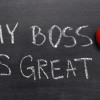Do You Bring Enough of Yourself to Work?
 For three years, Annamarie Ausnes and the barista at her local Tacoma, Washington Starbucks smiled at each other over the cash register, often exchanging a few friendly words.
For three years, Annamarie Ausnes and the barista at her local Tacoma, Washington Starbucks smiled at each other over the cash register, often exchanging a few friendly words.
One week the barista, Sandie Andersen, noticed that her customer looked unwell. She finally summoned the courage to say something. ‘You just don’t look well – what’s wrong?”
Anderson’s heartfelt and personal question most likely defied all her customer service training. Yet she made the decision to show up in the moment as an authentic human being who cared, even if meant feeling less “professional” or politically correct.
And on March 11, 2008, doctors at Virginia Mason Hospital in Seattle successfully transplanted a kidney from the barista to her customer, who at the time had only 15% of her kidney function left, with no donors in sight after years of searching.
The payoff for authenticity in the workplace is rarely a miraculously saved life or such a profoundly moving story. But frequently, a person’s authenticity does result in saved (or much stronger) work relationships, psyches, or businesses.
JUST WHAT IS “AUTHENTICITY,” ANYWAY?
Authenticity boils down being real. Not scripted, perfect, well-coiffed, or under control 100% of the time. Authentic leaders let an (appropriate) amount of who-they-are out of the bag.
And unlike the highly cool, macho Fonz in television’s long-running Happy Days show, they can and do utter the words “I’m wrong.” (Henry Winkler’s character developed an endearing stutter at the letter “W” which made it impossible to finish that phrase.)
Erosion of trust is often the biggest issue for those who appear superhuman. If a leader is perceived of hiding imperfections, emotions, or his or her own colorful self – what else might he or she be hiding? The fact that your business unit is moving to rural Nebraska next June? Or that you’ll never qualify for that promotion you really really really want? We tend to forgive and continue embracing leaders who confess to frailties (witness Bill Clinton), and remain suspicious of leaders whose lives read like fairy tales (witness Mitt Romney).
WHY VULNERABILITY BRINGS STRENGTH
In his book Discover Your True North, Bill George describes former Charles Schwab CEO David Pottruck’s early lessons on being real and vulnerable. As head of marketing at Schwab in the 90’s, his boss rated him poorly, explaining bluntly that his colleagues didn’t trust him. They resented his larger-than-life aggressiveness and extreme hours. After working with a coach, he began weaving stories about his life, fears, ambitions, and failures into his conversations and presentations. And earned back enough organizational trust over time to win the co-CEO role.
In 2004, a stretch of poor company performance resulted in Pottruck’s dismissal from his CEO role, putting an end to his 20-year career at Schwab. But he brought his early lessons on “being real” with him as he forged a new life. When speaking shortly after his dismissal at his alma mater, the Wharton School, his halting frankness earned him a standing ovation according to Fast Company:
It’s new to me to be an ex-CEO. My leaving Schwab was on less than elegant terms. It was a pretty humbling experience for me. It wasn’t humbling because I was replaced. . . . What is really humbling is to have time to reflect on what you’ve done and what you could have done better.
Ironically, it takes genuine confidence to show weakness. Which is exactly why leaders who share an appropriate amount of vulnerability are perceived as strong.
Being authentic is a balancing act. It does not mean overdoing the self-sharing. A drama queen (or king) is no better than an ice queen (or king). You don’t want it to become all about you, nor do you want to earn your HR department’s evil eye. And although consistency is associated with authenticity, you do NOT need to share the exact same facets of yourself with each audience.
To get a read on how others perceive you, talk with a few trusted colleagues who you can count on for the whole-truth-and-nothing-but-the-truth. Or sign up for a round of 360 multi-rater feedback. Are you perceived as “hard to read?” Do others feel you’re a transparent communicator? Do they see you learning and admitting to mistakes, as appropriate? Do they see warmth, color, and a real human being, along with all your layers of professional competence?
The ultimate gift of being authentic as a leader is that you embolden your team to bring their “real selves” to work, too. Resulting in a happier, more productive, and more loyal team.
So don’t let our culture’s leadership myths airbrush vulnerability, emotions, fun quirks, or imperfections out of YOUR leadership picture. The most potent leadership brews are a blend of great skills, experience, intentions, and values, topped off with just enough personal vulnerability to cement trusting relationships with others.
 The Dark Side of Collaboration, And How to Fight BackSeptember 15, 2024
The Dark Side of Collaboration, And How to Fight BackSeptember 15, 2024 Want to be the boss everyone loves?November 15, 2024
Want to be the boss everyone loves?November 15, 2024




1 comments